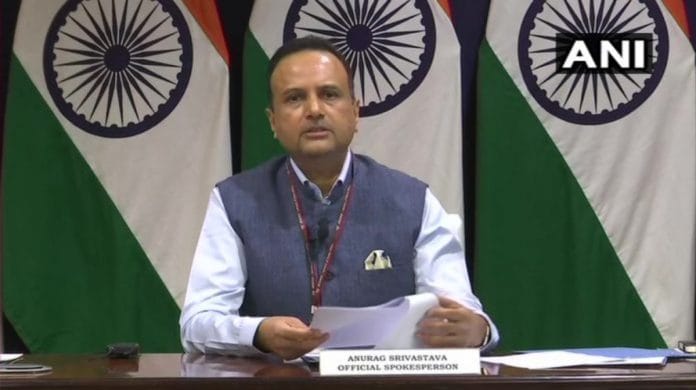New Delhi: India Friday said the six-month-long border stand-off with China was due to Beijing violating the bilateral agreements aimed at maintaining peace at the border areas.
“Our position has been very clear and has been articulated several times in the past. The situation that we have seen in the last six months has been a result of the actions of the Chinese side, which has sought to effect a unilateral change in status along the Line of Actual Control (LAC) in eastern Ladakh,” Ministry of External Affairs (MEA) spokesperson Anurag Srivastava said at a virtual media briefing.
“These actions are in violation of the bilateral agreements and protocol on ensuring peace and tranquility along the LAC in the India-China border areas.”
The Ministry of External Affairs also urged China to match its words with actions, a day after the Chinese Foreign Ministry said Beijing has “strictly complied” with the pacts on boundary affairs agreed by both sides.
On Thursday the Chinese Foreign Ministry spokesperson Hua Chunying also stated that while China-India relations face “difficulties and challenges”, Beijing’s policy towards New Delhi “has not changed”.
Srivastava Friday said China has to follow the bilateral agreements signed in 1993 and 1996, under which both sides have agreed not to amass troops and not take unilateral action to alter the LAC.
“We expect that the Chinese side will match its words with actions,” the MEA spokesperson said, adding that the communication channels between New Delhi and Beijing are on.
“The two sides have continued to maintain communication through diplomatic and military channels,” Srivastava said. “It is our expectation that further discussions will help both sides to achieve an agreement on a mutually acceptable solution for ensuring complete disengagement in all friction points along the LAC in the Western sector and full restoration of peace and tranquility as early as possible.”
The last round of Working Mechanism for Consultation and Coordination on India-China Border Affairs (WMCC) talks at the level of diplomats was held on 30 September, followed by a meeting of senior military commanders at Chushul on 12 October.
On Wednesday, while addressing an event by Australian think-tank Lowy Institute, External Affairs Minister S. Jaishankar had stated that the bilateral relationship between New Delhi and Beijing was “significantly damaged” in the past year.
He had also said that India has been persistently raising the issue of violation of the bilateral pacts even as the Chinese have come up with “five different explanations” on the matter.
Also read: India, China must redouble efforts to ‘meet each other halfway’, envoy Sun Weidong says
India-China joint release of commemorative stamps
The MEA Friday also said an event had been agreed upon last year in which India and China had planned to jointly launch commemorative stamps to mark the 70th anniversary of diplomatic relations between the two countries.
“However, there had been no discussion on any launch date with any Chinese authorities for this activity. We have also seen the Chinese embassy’s tweet suggesting that this event was cancelled by the Chinese side on account of no feedback given by the Indian side before the launch time agreed by both — this is factually incorrect,” Srivastava said, adding that the launch of the 70th anniversary celebrations itself has not taken place yet and thus the issue of going ahead with joint activities under its ambit does not arise.
The Chinese Embassy spokesperson Ji Rong had Thursday tweeted that it was India that did not come back to them with a date to launch the stamps and thus the event got cancelled.
India downplays Russia’s remarks
The government, meanwhile, sought to downplay the strong comments made by Russia earlier this week that the western world, particularly the US, had made India “an object of the Western countries’ persistent, aggressive and devious policy as they are trying to engage it in anti-China games by promoting Indo-Pacific strategies”.
The comments were made by Russian Foreign Minister Sergey Lavrov Tuesday. He said the US has launched a “game” thereby preventing the formation of a multipolar world.
“India enjoys long-standing relations with Russia characterised by a Special & Privileged Strategic Partnership,” Srivastava said. “This year marks the 20th anniversary of our strategic partnership with Russia. Our relations with Russia stand on their own merits including in the sphere of Military Technical Cooperation.
“As unequivocally outlined by the PM during his speech at the Shangri-La dialogue in June 2018, India does not see the Indo-Pacific region as a strategy or as a club of limited members or as a grouping that seeks to dominate,” he added. “It is not directed against any country. It stands for a free, open and inclusive region.”
The MEA spokesperson said that India has always pursued an “independent foreign policy based on its national interest” and that “India’s relationship with each country is independent of its relations with third countries”.
“We hope that this is well understood and appreciated by all our partners,” he added.
Also read: Nepal, China in ‘new era’ of strategic ties, vow to strengthen trans-Himalayan connectivity







Revocation of Article 370 makes all previous agreements null and void.